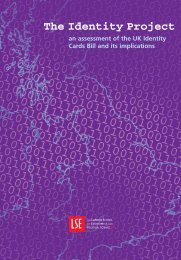Money Laundering: Review of the Reporting ... - Dematerialised ID
Money Laundering: Review of the Reporting ... - Dematerialised ID
Money Laundering: Review of the Reporting ... - Dematerialised ID
You also want an ePaper? Increase the reach of your titles
YUMPU automatically turns print PDFs into web optimized ePapers that Google loves.
kpmg<br />
<strong>Review</strong> <strong>of</strong> <strong>the</strong> regime for handling Suspicious Activity Reports<br />
Report <strong>of</strong> recommendations<br />
KPMG LLP<br />
4.2.2 A lack <strong>of</strong> clear common objectives has meant that some stakeholders have focused solely<br />
on <strong>the</strong>ir own issues and concerns and this has, at times, led to an apparent blame culture<br />
between participants. A lack <strong>of</strong> transparency and information available to stakeholders<br />
across <strong>the</strong> regime also contributes to this lack <strong>of</strong> trust.<br />
Relevant performance indicators<br />
4.2.3 As <strong>the</strong>re is no ownership <strong>of</strong> <strong>the</strong> SAR regime, <strong>the</strong>re are no clear and appropriate tracking<br />
measures and management indicators across <strong>the</strong> process as a whole. Our review has<br />
highlighted that <strong>the</strong>re is a significant lack <strong>of</strong> management information systems at a<br />
number <strong>of</strong> LEAs to allow tracking <strong>of</strong> <strong>the</strong> uses <strong>of</strong> SARs disseminated to <strong>the</strong>m. Such<br />
systems would help track <strong>the</strong> effectiveness <strong>of</strong> <strong>the</strong> regime to help ensure that it is meeting<br />
its aims and objectives. ECB has two specific key performance indicators (“KPIs”),<br />
which are to process all fast-track SARs within 24 hours and 95% <strong>of</strong> all SARs within five<br />
days, but <strong>the</strong> current processing backlog makes <strong>the</strong> second <strong>of</strong> <strong>the</strong>se irrelevant. These<br />
KPIs are process-driven and can <strong>the</strong>refore become an end in <strong>the</strong>mselves at <strong>the</strong> expense <strong>of</strong><br />
<strong>the</strong> quality <strong>of</strong> service provided by ECB.<br />
4.3 Quantity <strong>of</strong> SARs and quality <strong>of</strong> reporting<br />
Growth in SAR reporting<br />
4.3.1 The average number <strong>of</strong> SARs disclosed on an annual basis in <strong>the</strong> UK remained in a range<br />
between 13,700 (1995) and 18,408 (2000) in <strong>the</strong> years between 1994 and 2000. This<br />
figure jumped by 70% in 2001 to 31,251; it <strong>the</strong>n more than doubled in 2002 to a total <strong>of</strong><br />
64,164. The indications are that this growth has continued in 2003, with 21,433<br />
disclosures made in <strong>the</strong> first three months <strong>of</strong> <strong>the</strong> year. 9<br />
Figure 4.1: Numbers <strong>of</strong> SARs received annually<br />
120,000<br />
100,000<br />
80,000<br />
60,000<br />
40,000<br />
20,000<br />
0<br />
1987 1988 1989 1990 1991 1992 1993 1994 1995 1996 1997 1998 1999 2000 2001 2002<br />
2003*<br />
Source: NCIS ECB/KPMG<br />
estimate<br />
* Q1 actual and estimate for full year<br />
jo/fh/519 33









